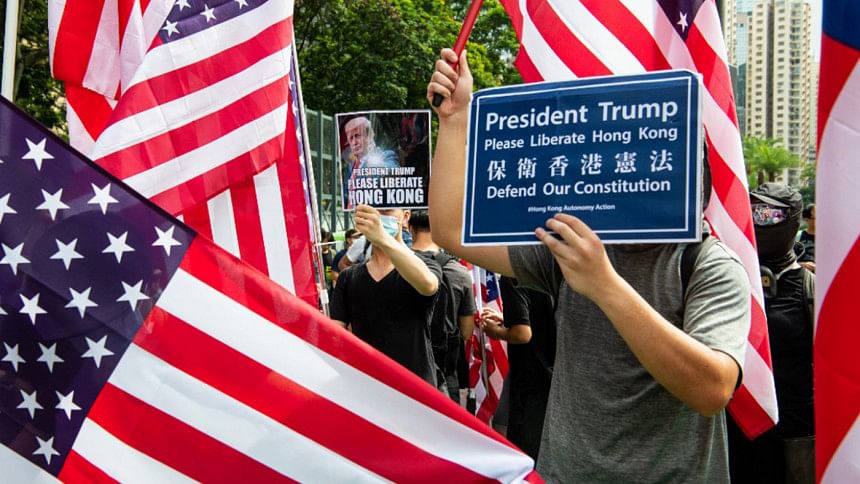Hong Kong adds another dimension to US-China trade war

The United States and China have been embroiled in a trade war for almost two years with reciprocal tariffs and fiery rhetoric coming from both sides.
Both economies have suffered and the world's two largest economies both face the looming threat of recession.
China, in addition to a tenuous economic situation is also facing more woes in Hong Kong, a Chinese territory that is self-governed.
Protesters have taken to the streets in the island-territory after a proposed extradition law was publicly opposed.
The protests have evolved beyond the initial grievances to long-held anxieties over the economy, living space and, ultimately, rule by Beijing.
As the pro-democracy protests gather steam and threaten to become more widespread and violent, the United States has involved itself and added a new dimension in the ongoing US-China trade war.
Precipitating Circumstance
Thomas Write, a senior fellow at the Brookings Institution, argues that Hong Kong represents US President Donald Trump's first real foreign policy crisis.
In an article in the Atlantic, Write argues that if Trump and Chinese President Xi Jinping do not correctly handle the situation in Hong Kong, any rapprochement in the trade war would likely be lost and an economic crisis will creep closer and closer to reality.
Trump has, in the past, suggested he has a close relationship with Xi. A meeting between the two presidents at the G20 summit in June gave merit to the claims as both leaders said after the meeting that a settlement was within reach.
Negotiations by trade representatives from both countries have subsequently failed to produce a result and Donald Trump has escalated things further by implementing more tariffs on Chinese goods. Beijing responded by momentarily devaluing its currency sparking mass selloffs and historic market dips.
US Interference
With both sides engaged in a game of economic brinkmanship, Hong Kong has added another complex layer to an already complex situation.
Trump has offered his opinion on Hong Kong before, tweeting in July that the demonstrators in Hong Kong were "looking for democracy" but "some governments don't want democracy."
China responded at the time that it "deplored and strongly opposed [Trump's] gross interference in Hong Kong affairs and China's internal affairs."
Trump's Cabinet and closest allies in Congress have also expressed hawkish views on China and any potential action it may take in Hong Kong.
National Security Advisor John Bolton has warned China against repeating a crackdown like those it carried out during the Tiananmen Square massacre.
"The Chinese have to look very carefully at the steps they take because people in America remember Tiananmen Square, they remember the picture of the man standing in front of the line of tanks,' Bolton said.
"It would be a big mistake to create a new memory like that in Hong Kong."
Trump, seemingly heeding advice from Bolton and others like US Senator Lindsey Graham, tweeted yesterday that if China wanted to make a trade deal it would first have to "…work humanely with Hong Kong."
It is the first time that the US President has linked the trade war to Hong Kong and was a marked shift from previous statements he had made in early August when he said whatever happened in Hong Kong was "between Hong Kong [and] China because Hong Kong is a part of China. They'll have to deal with that themselves."
No easy options for China
China has accused the US of interfering in its internal affairs. The Chinese embassy in the United States officially protested when members of the US consulate in Hong Kong met with protesters.
A spokesperson for the Office of the Commissioner of the Chinese Foreign Ministry in the Hong Kong Special Administrative Region said that the US, specifically some US Congressmen, were "the black hands behind the violent extremists."
"The anti-China forces that intend to destabilize Hong Kong should never underestimate our firm will and capability to safeguard the national sovereignty and security and to maintain Hong Kong's prosperity and stability," the spokesperson added.
China said it also had the legal rights to crackdown on the protesters should there be a clear link between ongoing protests and 'terrorism.'
Analysts agree though that unless something drastic occurs, Beijing would likely want to avoid sending the People's Liberation Army into Hong Kong. (This hasn't stopped China from mobilizing its forces to the border in a show of force)
Any PLA action in Hong Kong would destroy the one country, two system mode of government China has long touted, a crackdown would seriously destabilize the regional and global economy and push Taiwan further towards independence. It also seems that now, after Trump's tweet, it would also exacerbate the trade war.
As Thomas Write stated:
"A violent crackdown would almost surely lead to the imposition of sanctions by the U.S. Congress, if necessary with a supermajority to overcome a presidential veto. The decoupling would not be confined to Hong Kong. The tariffs and restrictions imposed to generate leverage in trade negotiations would become permanent.
It seems that unless Xi and Trump can carefully maneuver around the banana peel that Hong Kong has become, the city could be the catalyst to an even more destructive US-China relationship.

 For all latest news, follow The Daily Star's Google News channel.
For all latest news, follow The Daily Star's Google News channel. 



Comments